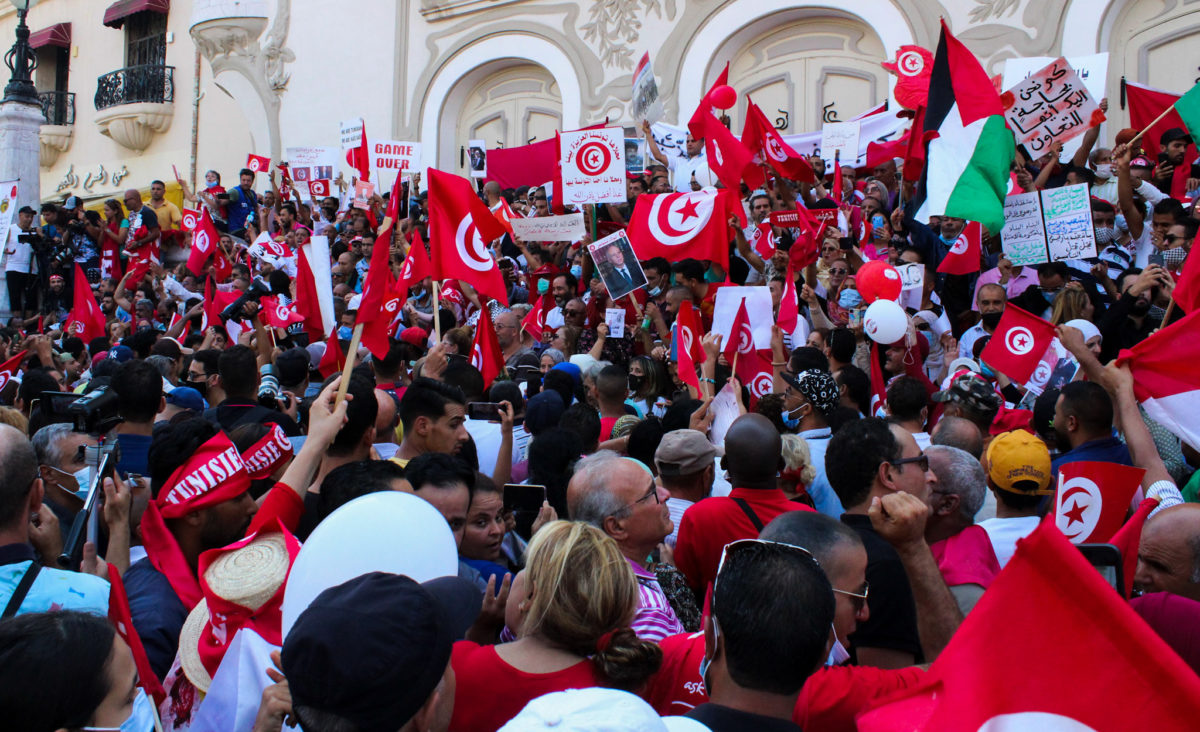AU has a responsibility to help protect Tunisia’s democracy
By Adem K Abebe On July 25, exactly one year after Tunisia’s President Kais Saied sacked the prime minister, dissolved the parliament, suspended the much-celebrated 2014 constitution and started to rule by decree, Tunisians voted to approve a draft constitution proposed by him that critics warn will help entrench his one-man rule. With less than […]

By Adem K Abebe
On July 25, exactly one year after Tunisia’s President Kais Saied sacked the prime minister, dissolved the parliament, suspended the much-celebrated 2014 constitution and started to rule by decree, Tunisians voted to approve a draft constitution proposed by him that critics warn will help entrench his one-man rule.
With less than 30 per cent turnout, there are serious questions about the legitimacy of Monday’s referendum. Nevertheless, the deep divisions within the opposition and the public’s ever-growing disillusionment with the political system mean Saied may face little resistance as he moves to further consolidate his power.
Now, as they watch with worry Tunisia’s democratic backsliding identified by the International Institute for Democracy and Electoral Assistance, many are questioning what the international community, and especially the African Union (AU) – which counts among its objectives promoting “democratic principles and institutions” on the continent – could have done and can still do to keep the North African nation on the path towards true democracy.
In fact, in February 2022, it signalled that it is mostly unconcerned with President Saied’s actions by making the country a member of the AU Peace and Security Council – a powerful body charged with, among other things, monitoring compliance with constitutionalism and responding to unconstitutional changes of government.
It seems the AU opted not to prioritise Tunisia’s concerning, but so far thankfully non-violent, democratic backsliding and instead focused its meagre resources on countries that are experiencing grave political instability, economic devastation and conflict.
The AU should have at least sought to engage Tunisian authorities, the opposition and civil society groups, to ensure compliance with the principle of national consensus in constitutional reform processes established in the African Charter for Democracy, Elections and Governance – an instrument Tunisia signed that reflects established AU standards on constitutionalism.
By intervening in Tunisia’s much criticised constitutional reform process, the AU could have shown that it is treating all member countries equally and addressed criticisms of hypocrisy that have long been undermining its credibility.
The continental standards for constitutional change require (1) legality and compliance with the letter and spirit of constitutional rules for reform, (2) a genuinely consultative and participatory process, including, possibly, a referendum, (3) a free and stable political environment, and (4) a deliberative process that eschews unilateral decisions and instead necessitates inclusion beyond a single dominant person or political group.
In Tunisia, Saied simply disregarded the processes of reform outlined in the 2014 constitution and unilaterally adopted his own process, which allowed him to avoid any stringent requirements for the referendum, for instance, in the form of a minimum turnout requirement.
Moreover, despite purported efforts to allow Tunisians to submit their views, the process did not involve genuine participation and deliberation. Active AU monitoring and diplomatic engagement and an offer to provide comparative advice and technical support could potentially have contributed to ensuring a genuinely participatory and deliberative process.
The AU has yet squandered an opportunity to define itself as a union of rules, rather than a club of incumbents.
Saied’s track record so far and his proclivity to elevate his personal vision over the terms and spirit of the constitution mean Tunisians may now be bracing for a potential president for life.
But the AU can still take action to prevent this scenario. It can engage Tunisian authorities to clarify their position and pressure them to confirm that the new constitution would not reset the presidential term count. As a member of the AU Peace and Security Council, Tunisia has a heightened moral responsibility to uphold the spirit of alternation of power imbued in continental standards.
The new parliament, which is due to be elected in December, will therefore have tremendous potential to shape the organisation of these critical bodies and to preclude the president’s grip on their independence. This means the upcoming legislative election may provide an important opportunity for Saied’s opponents to limit his consolidation of power – and put the breaks on his perceived efforts to entrench one-man rule in the country. Indeed, if opposition parties manage to rally the supermajority that boycotted the constitutional referendum and translate that into legislative seats, it could allow them to temper the personalisation of power.
Given the overwhelming number of voters who boycotted the constitutional referendum, it is unlikely for Saied to secure in the December elections the parliamentary majority he needs to fully codify a one-man rule.
The AU has a legal and moral responsibility to reduce the prospects of instability and insecurity in Tunisia. By standing up for democracy and rule of law in Tunisia, the continental body would not only help Tunisians sustain the democratic gains they made in the past decade, but also show the entire continent that it is indeed serious about holding its members to the standards of constitutionalism it set.
Source: Aljazeera
